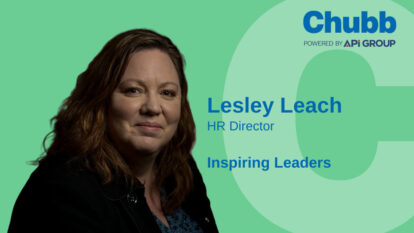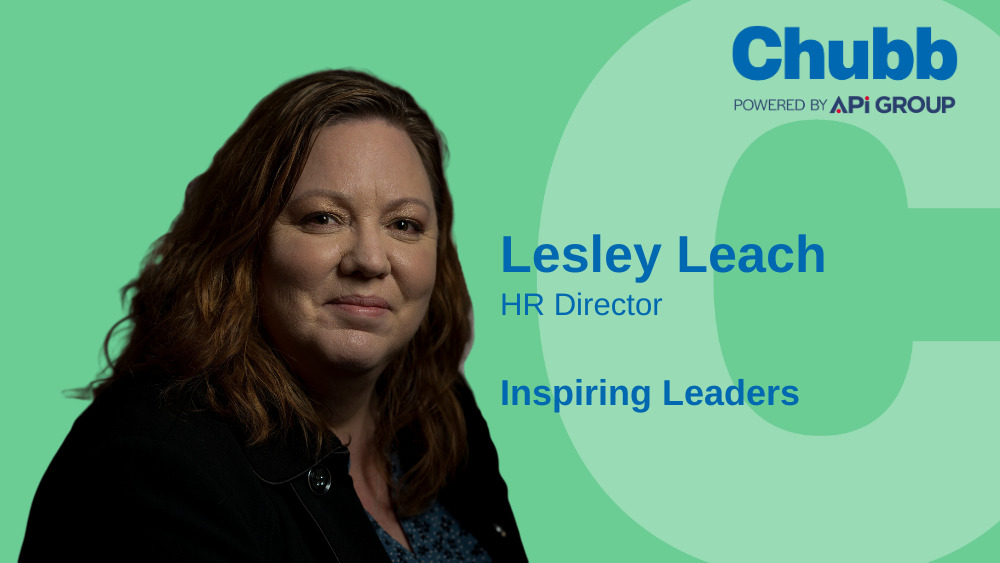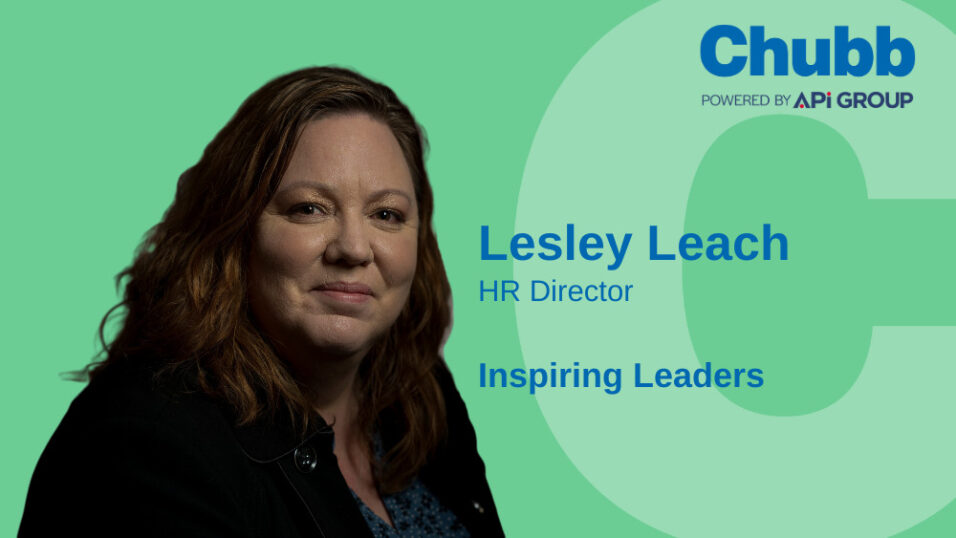



Breaking stigmas and building cultures
By Chubb | 17th August 2023




By Chubb | 17th August 2023
Next up in the Inspiring Leaders series is our Human Resources Director for UKI and Europe, Lesley Leach. Lesley has been the UK and Ireland HR Director since 2019 and has a deep-rooted passion for helping people develop and thrive at work. Read on to discover more about how Lesley started in HR, her passion for employee well-being, how she helps steer the Building Great Leaders culture in Chubb UKI, and her passion for motorcycles, wine collecting and gardening. I am the middle child among five siblings and was born in Southampton, Hampshire. My parents hailed from Scotland and lived in Edinburgh where my elder brother and sister were born. We moved down to England and after my arrival, my younger sister joined the family. We lived on the southern coast until I was six years old before moving to South Africa where my youngest brother was born. As a result, my immediate family boasts a diverse range of birthplaces and cultures.
Growing up in South Africa
I did all my schooling in South Africa, from primary to high school. As a teenager, I was probably every parent’s worst nightmare. I had a rebellious streak and constantly pushed boundaries. One night, at the age of 13, I even managed to sneak into a nightclub and ended up spending the night in a prison holding cell instead. While it was an exciting experience at the time, I soon faced the consequences. Looking back, I realise that hitchhiking everywhere as a young teenage girl in South Africa probably wasn’t the safest thing to do, but I never experienced any incidents. As you get older, you realise what a great influence your parents are on you – even if you didn’t think so at the time. But they taught me a lot, especially the need to be honest, do things with integrity, and work hard. Growing up, my brothers, sisters, and I had our set chores. My parents were excellent teachers who encouraged us to work things out for ourselves, which has made me who I am today. During my upbringing, the Apartheid era had a significant impact on me. Witnessing the violence, the process of reconciliation, and the aftermath made me view things beyond ethnicity. I have a broader perspective than those who haven’t experienced similar events. Moving to South Africa was a cultural shock for my family and me. Sometimes, I asked my father why we moved there, but the experience taught me many valuable lessons. Additionally, if we hadn’t relocated, I wouldn’t have met my husband, adopted our mixed-race son Keanu or (by some miracle) given birth to Liam, much later in life I must say! Therefore, I wouldn’t change anything about it.
Early career
After completing my final year in school, I started working right away. I aspired to become a veterinary surgeon and work with animals. However, pursuing this dream was costly, and I needed to work to finance my education. I started working at IDC (International Delivery Company) as a personnel administrator when I was 17 years old. Within two years, I was the administration manager and then became the personnel manager. Personnel back then was very different to the HR role of today. For all those aspiring HR professionals out there, some 20 years ago, we had to write, by hand, employee wage slips and put actual cash in wage packets. Quickbooks and Xero didn’t exist. It was about that time that I became seriously interested in Human Resources and gave up on being a veterinary surgeon. I got my first qualification through the Institute of People Management. It was a five-year qualification, and I was working all the way through, so it was part-time study and night classes. Later, I went on to study Industrial and Organisational Psychology at the University of South Africa. After working in various HR roles for big and small companies in healthcare, logistics, and even as an HR consultant for an HIV research organisation, I started working at Chubb in 2010. I was the HR business partner for what they called the Inland Region. So, all the non-coastal branches in South Africa and the main security monitoring centre in Johannesburg. In 2012, I was told by the Managing Director to pack my bags and move to Chubb’s head office because the HR Director had resigned – and I was filling the role. In 2014 we decided we wanted to move to the UK, and I transferred to Chubb’s global HR team, based out of Ashford. But South Africa pulled me back in and I was asked to guide the business through its divestiture. Two years later, in 2016, I was back in the UK and held various global HR roles as well as HR Director for Europe. In 2019, the business decided to collapse the regions, and in September of that year, I moved into my role as HR Director for UK and Ireland.
Putting the ‘Human’ in Human Resources
For me, there are two sides to human resources. There’s what many would consider the softer side, such as the engagement, cultural, and professional development activities. Then there’s the hardline piece, which includes labour law, disputes, and grievances. My experience has taught me that every situation is different, and you need to know what you’re talking about. But the softer side is where the major opportunity lies because that’s where you can make the biggest difference to people. Especially now. The common HR themes are around diversity, engagement and well-being: stress levels and work-life balance. Every organisation is trying to improve their employees’ wellness and mental health, and HR professionals can have a huge influence on this. Some companies think that putting a bowl of fruit in the canteen or having a ping pong table in the staff room helps employees deal with their mental health issues. That doesn’t even scratch the surface. I’m passionate about providing the right employer-funded tools and resources so people know where to find support, the likes of mental health first aid and online portals packed with resources. Additionally, there is a big opportunity (and something I’m driving forward at Chubb) to break down stigmas. At Chubb, our goal is to establish a culture where individuals feel at ease discussing work-related matters, stress, workload, work-life balance, and mental health. We encourage our colleagues to speak up and seek support if they are not feeling their best. We ensure that our managers and the company provide the necessary support to those who need it. We aim to have more individuals come forward and share their experiences to make this a common practice. Our ultimate goal is to create a culture where everyone feels comfortable discussing these topics.
Building Great Leaders culture
Upon joining APi Group, we were introduced to Building Great Leaders. I was requested to assess and evaluate some of its online modules to determine their global transferability. My evaluation was honest and concluded that the program was excellent. However, I emphasised that it is not merely a program but a culture. When we talk about Building Great Leaders with our colleagues, we need to be very clear about what it is because some people struggle with the concept. If they are not in a leadership role then that must mean they’re not a leader. But that’s not true at all. We’re talking about people taking the lead to manage themselves, lead others around them, and look after their customers. If everybody feels empowered to make decisions and support their colleagues, then business results, customer satisfaction, and employee engagement improves and takes care of itself.
Lesley the leader
Part of the Building Great Leaders culture is ‘Leader Labs’. I have attended a few of these now, and they are eye-opening. I felt like somebody ripped the blinkers off me. There was this ‘ah ha’ moment when the presenter revealed that as an individual, you either have a positive or a negative impact on people. It’s never neutral. That hit me like a tonne of bricks. It’s made me reflect on my own leadership style and really emphasised the need to be authentic. I’d like to think that what you see is what you get with me. I don’t try to be anybody other than myself. Being a great leader is also about good, clear communication that is two-way. I know the importance of listening to my team and valuing what they are saying. If they need help, of course, I’m always here, and I’ll always guide them and help them make decisions, but first and foremost, I want to empower them, support them, give them opportunities, and be credible and honest.
Quick Fire Questions:
What word would your family use to describe you?
They’d probably say I’m eccentric. To be fair, that’s accurate. Anyone who properly knows me or has been to my house will know there’s some crazy, wacky stuff on the walls. My husband knows that any sentence that starts with “Hey, love, I’ve been thinking…” usually means I want to change things in the house or garden.
You’re in Vegas, playing roulette, what number are you backing?
13 Black. It’s almost like tempting fate isn’t it? Most people think the number 13 is bad luck, I think it’s different.
Food lover or food maker?
I’m a food lover. Having said that, I do enjoy cooking – but on my terms, like being inspired to make something creative out of baked beans after watching Jamie Oliver or something. I need inspiration to cook because if you told me I had to cook dinner every night for my family, I’d feel so sorry for them. My husband Vaughan is the cook at home; he’s a foodie through and through, and my eldest son Keanu is a chef…how lucky am I? My favourite food is anything Mexican/Spanish; Tacos. Fajitas. Enchiladas. Tapas.And Mexico is on my bucket list of places to visit.
Beach holiday or city break?
A little bit of everything. We have a trip to Greece planned soon, and I know I’ll want cocktails on the beach and laze by the pool. But after an hour, I’ll need to do something else. I’ll want to explore the towns and cities to see the incredible architecture, history, wildlife, and sightseeing – I want to do it all.
Where do you see yourself in 20 years?
We dream of buying a holiday home in Greece, Spain, Portugal, or somewhere like that. But I don’t see myself living there all the time. It would be a great base to travel and see different parts of the country we end up in. I’d also still be hosting ‘Bitchin Book Club’ with my friends because that’s very important to me – the girl power group. I’m a very social creature. I find it very difficult to just stay at home. I must be out doing things. So hopefully, (finances allowing) quite a bit of travel in the sun.
Where did your love of motorcycles come from?
So, my husband was born on a motorbike, I’m sure of it because he has been riding motorcycles pretty much all his life. After we married, I’d often go along to bike rally weekends or join in with charity cycles, and I was always the passenger on the back. After getting fed up with the situation, I decided to take a different approach. Since we were residing in South Africa, I obtained my learner’s license and received my first motorcycle as a gift from my husband. I rode it frequently until we left for the UK, when I sold it. However, my husband surprised me with another motorcycle a few years ago in the UK, which I have been using ever since. I have no idea what model it is. I’m one of those girls that describes it by colour rather than the make. But it’s black, and it’s a little low-down cruiser. At the weekends, we’ll often ride up to the garden centre for breakfast and chat about doing a bike road trip. Finally, this summer, we’re putting our plans in place and going to travel around the UK more.
What’s your favourite colour?
That’s a hard one. The truth is, whenever I go clothes shopping or look at clothes, I’m always drawn to blue. I also like green, yellow, red, pink, and orange. I can categorically say that there are three colours I don’t like, cream, grey and brown.
What’s your favourite book?
I’ve got a couple. One is Nelson Mandela’s book, Long Walk to Freedom. I recently read Chaos, by James Gleick, which introduces the chaos theory – that was really good. And all the Wilbur Smith books. I own pretty much all of them.
What advice would you give to someone wanting to start a career in HR?
Two things. Firstly, absolutely go for it. Overall, it is a very rewarding career. Yes, there are some difficult things you need to do, like delivering bad news and letting people go, but there is such reward in seeing people develop and grow, especially from the training and initiatives you’ve put in place and seeing them come to fruition. For example, the Next Generation Leadership programme that we developed six years ago has produced some excellent leaders, like David Dunnagan, Sue Dean, Gary Moffatt, Georgina Wilson and many more. It is so rewarding to see. The other thing that is important for me to mention is that HR can sometimes be slightly lonely. By our nature, we’re often taking care of other people. But as an HR leader, you need to make sure there is somebody there to take care of you and your team.